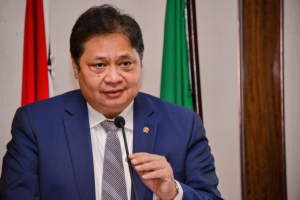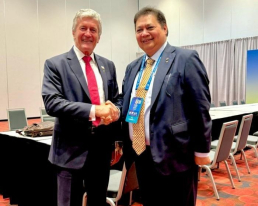Indonesia breaks ground as OECD initiates accession talks, aims for global standards
In a historic move, the Organization for Economic Cooperation and Development (OECD) has decided to open accession discussions with Indonesia, marking a significant milestone in their collaborative efforts.
Indonesia becomes the first ASEAN country accepted for OECD accession and the third Asian nation after Japan and South Korea, emphasizing the growing partnership between the two sides.
Coordinating Minister for the Economy, Airlangga Hartarto, hailed the decision as a "historic momentum" during an encounter at the Presidential Palace on February 21, 2024.
The OECD, renowned for emphasizing global collaboration and formulating international standards, has been a strategic partner for the Indonesian government, aiding in crafting progressive national policies with global acceptance.
Following the decision to open accession discussions, the OECD will release a roadmap for Indonesia's membership, outlining the necessary processes, particularly regarding regulatory legislation.
"Through this roadmap, various required processes, especially those related to regulations and laws, can be implemented," stated Airlangga.
The draft accession roadmap, jointly prepared by the OECD and the Indonesian government, will cover various policy areas and focus on priority issues such as open trade and investment, public governance, integrity, anti-corruption efforts, and environmental protection with a focus on addressing climate change.
Through accession talks, the OECD aims to support Indonesia in continuing its reform efforts to achieve the vision of becoming a developed country with a minimum per capita income of US$30,300 (Rp 474 million) by 2045.
A positive impact on the general public is anticipated through Indonesia's membership and alignment of regulations with OECD standards, including increased investment value, fostering global participation of SMEs, and enhancing human resource quality.
"We also hope that OECD accession can support the Indonesian government's priority programs, including green economy, digitalization, human resource development, good governance, and accelerating Indonesia's escape from the middle-income trap," Airlangga said.
He also conveyed that written support for Indonesia's accession process has been obtained from Australia, Japan, Germany, and Slovakia. Since 2007, Indonesia has been a key partner of the OECD, collaborating on economic, social, and environmental policies.
In 2014, the country played a crucial role in launching the Southeast Asia Regional Program, becoming one of the inaugural co-chairs.
"This decision by the OECD today is a historic moment. Initiating accession discussions with Indonesia is a first in Southeast Asia, one of the world's most dynamically growing regions," said OECD Secretary-General Mathias Cormann in his press release.
As the largest economy in ASEAN and the third-largest democracy globally, Indonesia holds significant global influence.
"The decision to open accession discussions will be mutually beneficial for Indonesia and the OECD," Cormann added.
Through these discussions, the organization aims to provide support to Indonesia in its ongoing reform journey, working towards its vision of becoming an economically advanced nation by 2045.
Already have an account? Sign In
-
Start reading
Freemium
-
Monthly Subscription
30% OFF$26.03
$37.19/MonthCancel anytime
This offer is open to all new subscribers!
Subscribe now -
Yearly Subscription
33% OFF$228.13
$340.5/YearCancel anytime
This offer is open to all new subscribers!
Subscribe now






